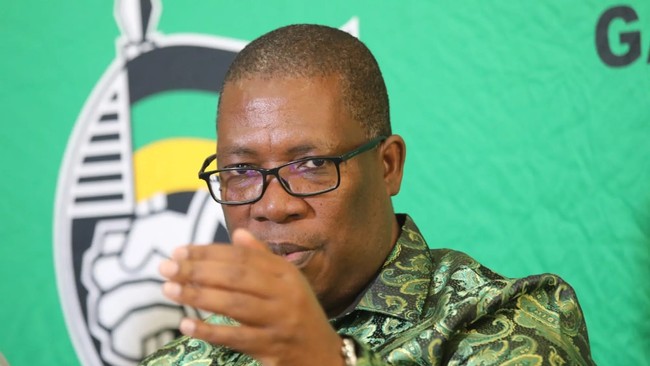On a sweltering afternoon of May 25, 2024, at the packed FNB Stadium in Johannesburg, the African National Congress (ANC) held its final rally before the pivotal elections. Amidst the crowd of 70,000 supporters enduring the heat, a clear shift in party dynamics unfolded.
As Gauteng Premier and ANC provincial chairperson Panyaza Lesufi took the podium to deliver the welcoming address, the crowd’s reception was thunderous, suggesting his growing popularity. In contrast, when President Cyril Ramaphosa took the stage, the applause was notably subdued—a lukewarm reception that paled compared to Lesufi’s.
For seasoned political observers, like this journalist, this was more than just a moment in the spotlight for Lesufi; it marked the beginning of his political challenges within the party. The enthusiastic response to Lesufi and the mild reception for Ramaphosa hinted at deeper tensions within the ANC, setting the stage for an internal battle that could escalate as the race toward the 2027 ANC national conference intensifies.
Lesufi vs. Mbalula: A Brewing Power Struggle
The developments this week at the ANC’s headquarters on Pixley Seme Street in Johannesburg appear to confirm what some predicted months ago: Panyaza Lesufi is facing a political storm from within the ANC. The party’s Secretary-General, Fikile Mbalula, summoned Lesufi for a meeting with the national officials, a move interpreted by many as a warning shot aimed at taming the rising star from Gauteng.
Though Lesufi has publicly denied ambitions to contest for the ANC’s top position in 2027, his growing popularity makes him a potential threat to Mbalula, who is eyeing the same position. Mbalula’s summoning of Lesufi is seen as political intimidation, a sign that Mbalula will not tolerate any obstacle in his path to the party’s highest office.
Even if Lesufi does not run for the presidency, he is perceived as an extension of Deputy President Paul Mashatile, who is expected to contest in 2027. Lesufi’s support for Mashatile, or even the perception of such support, poses a significant challenge to Mbalula’s ambitions.
Political Mastery and DA Tensions
Lesufi’s political maneuvering has also earned him the ire of the Democratic Alliance (DA). The DA leadership was left reeling after failing to secure a coalition with the ANC in Gauteng, following demands for key portfolios like health and education. Lesufi’s ability to form a provincial government without the DA, by garnering the support of the EFF and MK Party, was seen as a political masterstroke, leaving the DA seething.
DA leader Helen Zille has been vocal in her criticism of Lesufi, accusing him of undercutting the opposition. However, Lesufi’s strategic alliances allowed him to maintain control of the province, securing votes to pass the budget and key legislative measures.
AfriForum’s Long-standing Grudge
Adding to Lesufi’s political challenges is the Afrikaner interest group AfriForum, which has a long-standing grudge against him dating back to his time as Gauteng Education MEC. Lesufi’s advocacy for reforms, such as the Basic Education Laws Amendment (BELA) Bill, which mandates that schools using Afrikaans as the sole medium of instruction introduce other languages, has further angered AfriForum. Although President Ramaphosa signed the bill into law, AfriForum remains determined to oppose Lesufi’s efforts to transform education in the province.
Surrounded by Political Foes
With opponents circling from multiple fronts—both within the ANC and from outside forces like the DA and AfriForum—Lesufi faces a formidable battle ahead. Yet, his ability to align himself with the masses and navigate complex political landscapes may prove to be his greatest asset. Despite the growing pressure, Lesufi could very well survive these challenges and emerge as a key player in the ANC’s future, potentially carrying his momentum into the 2027 national conference.
For now, as the political maneuvering intensifies, all eyes are on Lesufi to see if he can withstand the mounting pressure and maintain his position in the party. His fate could reshape the future of the ANC and the broader South African political landscape.






















